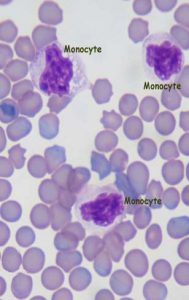Why Are The Number of Monocytes In My Dog Or My Cat’s Blood High?
Ron Hines DVM PhD
Monocytes In Your Pet’s Blood = Monos
When your veterinarian orders a CBC/WBC (complete blood cell count) for your dog and cat, monocytes will be one of the cell types listed in the results. Monocytes are a type of white blood cell. Monocytes are quite variable in size and appearance (pleomorphic). Monocytes are part of your dog and cat’s immune system. They are generated in your pet’s bone marrow and stored in its spleen (cords of billroth). They are a bit larger than neutrophils, lymphocytes and eosinophils which are the more common white blood cells listed in your dog and cat’s CBC/ WBC lab report. After being manufactured in your pet’s bone marrow, monocytes circulate in its blood stream briefly. They then take up residence in tissues throughout its body as macrophages and dendritic cells whose job it is to engulf (eat, “vacuum cleaner” effect) undesirable things that pass their way or present suspicious organic substances (bacteria, virus, other perceived antigens) to other immune cells (T-cells). The T-cells then make decisions as to whether those substances need to be cleansed from the body, destroyed or ignored. Within the last few years, it has become apparent that resident monocytes (aka macrophages) have other important duties that do not involve your pet’s immune system. Things as amazing as maintaining proper body temperature and regulating heartbeat. Monocytes come in two “flavors” one encourages inflammation and the other retards it. (read here)
Persistently high monocyte numbers only confirm the obvious – that your dog or cat is quite ill and has been for some time. The laboratory doing your dog or cat’s blood analysis or your veterinarian might even see phagocytized (engulfed) bacteria within some of the monocytes.
Some Reasons Why Your Pet’s Monocyte Count Might Be High (= Monocytosis):
All chronic infectious and non-infectious diseases that produce inflammation often increase monocyte numbers in dogs and cats. Stress or a trip to the veterinarian’s office (in dogs that is known, in cats?), corticosteroid administration (in dogs) can also cause a transient burst in its monocyte numbers.
On very rare occasions, leukemia of only the monocyte bone marrow cell line (monocytic leukemia) will elevate blood monocyte numbers.
Whenever your dog or cat’s blood neutrophil numbers go down (neutropenia), its monocyte numbers tend to go up. That could be due to an oral or injected corticosteroid medication or the administration of an immunosuppressive drug such as cyclosporin/Atopica®. Depletion of your pet’s bone marrow neutrophil reserves as occurs in many chronic infections is another common cause. Any condition in which large amounts of tissue damage (necrosis) occurs is another common cause for decreased neutrophil numbers and increased monocyte numbers. That could be due to various forms of cancer or chronic localized infections. Cushing’s disease which causes your pet’s own natural corticosteroid level to be elevated is another possible cause.
Some Reasons Your Pet’s Monocyte Count Could be Low Or Absent (Monocytopenia):
Less than normal, or no monocytes (= monocytopenia) are occasionally found in the blood samples of dogs and cats. When that occurs, it has not been published that it is directly related to any of the diseases or health issues that dogs and cats commonly face. However, monocytopenia is a common occurrence in humans that are receiving chemotherapy. Other known causes of low monocyte numbers in humans include aplastic anemia generalized infections and leukemia affecting the bone marrow (myeloid leukemia). Low or absent monocytes are never a positive finding since a particular class of monocytes, CD14++ are an important element of your dog or cat’s innate immune system.
DxMe
